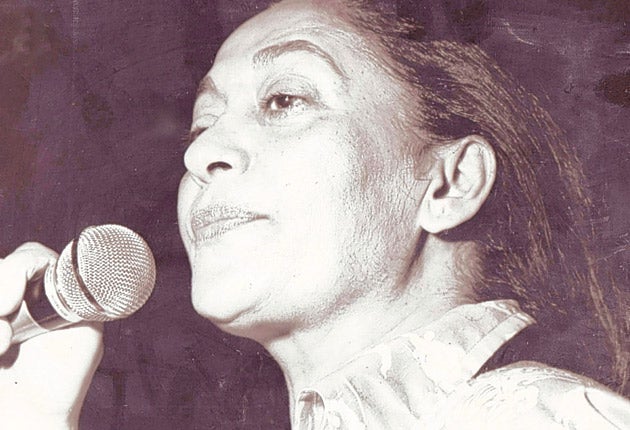Marzieh: Singer whose opposition to the mullahs led to her defection from Iran

In her later years, with her sweeping mane of tied-back grey hair, Marzieh was an imposing figure. Yet the Iranian light classical singer was emblematic of the great ideological split that occurred within and outside Iran after the toppling of the Shah's corrupt regime in the Islamic Revolution of February 1979. Having endured Ayatollah Khomeini's rules and prohibitions regarding music, the diva and her music increasingly took on political associations following her defection at the age of 70 in 1994.
She was born Ashraf os-Sadat Mortezai into a "traditional" family in the Iranian capital in 1924. Her mother came from a family absorbed in the arts while her father, a mullah, ensured that she received a formal education beyond that needed to become marriageable. She studied voice and musical theory, with her progress "certified", as she put it, by masters of Persian art music. In 1942, still 17, she took over the female lead in Shirin and Farhad, an epic Persian tale of Layla and Majnun or Romeo and Juliet strength. Her career advanced with radio broadcasts, public recitals and gramophone records. Adopting the stage name Marzieh, she became a household name in pre-revolutionary Iran, singing the old songs of Hafez as well as newly minted ones.
During the 1950s Marzieh became a mainstay on Tehran Radio and in December 1959 sang at the wedding of the Shah and his third wife, Farah Diba. In the years before the toppling of the Peacock Throne she enjoyed great success and acclaim. But the theocratic revolution relegated music to martial, revolutionary and patriotic functionality, strengthened by the mullahs' injunctions against women performing music in mixed company. Marzieh was effectively silenced. For 15 years, any sort of musical continuity in her life was ruptured and she lived between Tehran's wealthy Niavaran district, close to the Shah's last residence, and a house in the country.
In August 1994, on her way to London and the US, she met Maryam Rajavi of the National Council of Resistance of Iran (NCRI) in Paris – which, like southern California, is a centre of expatriate Iranian culture. She defected, leaving her first husband, daughter and grandchild in Iran. Rajavi appointed her adviser for the organisation's cultural and artistic affairs. The following March she gave a concert at the Royal Albert Hall. A portion of her repertoire bore testimony to her "muzzled" years. A portent of concerts to come, part of her repertoire breathed out the air of Mujahedeen propaganda. From her base in Paris, she forged new musical partnerships, notably with the exiled composer Mohammad Shams and the tar (long-necked lute) soloist Hamid Reza Taherzedeh.
She became a symbol for Iranian opposition, mouthpiece and cultural ambassador. In 1997 Yehudi Menuhin presented her at the Voices of Freedom concert at Brussels' Théâtre Royal alongside Miriam Makeba, Luzmila Carpio, Esperanza Fernandez and others. While admitting to the corruption of the Shah's rule, she denounced the mullahs for topping even the Shah's excesses, speaking up against religion-sanctioned outrages, particularly against women.
Marzieh's musical reputation remained largely confined to her native land or to the Iranian diaspora, and was grounded in Farsi poetics. She never cultivated a wider, non-Iranian audience, similar to those built by master instrumentalists and vocalists such as Hossein Alizadeh, Kayhan Kalhor, Mohammad Reza Shajarian or Parisa. She is barely mentioned, if at all, in most "world music" reference works – not on ideological or political grounds, but rather that a large body of her work was anodyne.
She gave her farewell performance at L'Olympia in Paris in April 2006. On 18 October she was buried in the Parisian suburb of Auvers-sur-Oise, where the NCRI is based. Her husbands and daughter predeceased her, while a son survives her.
Ken Hunt
Ashraf os-Sadat Mortezai (Marzieh), singer: born Tehran, Iran 1924; married firstly Hengameh Amini (deceased; one daughter, deceased), Malik Afzali (deceased; one son); died Paris 13 October 2010.
Subscribe to Independent Premium to bookmark this article
Want to bookmark your favourite articles and stories to read or reference later? Start your Independent Premium subscription today.

Join our commenting forum
Join thought-provoking conversations, follow other Independent readers and see their replies